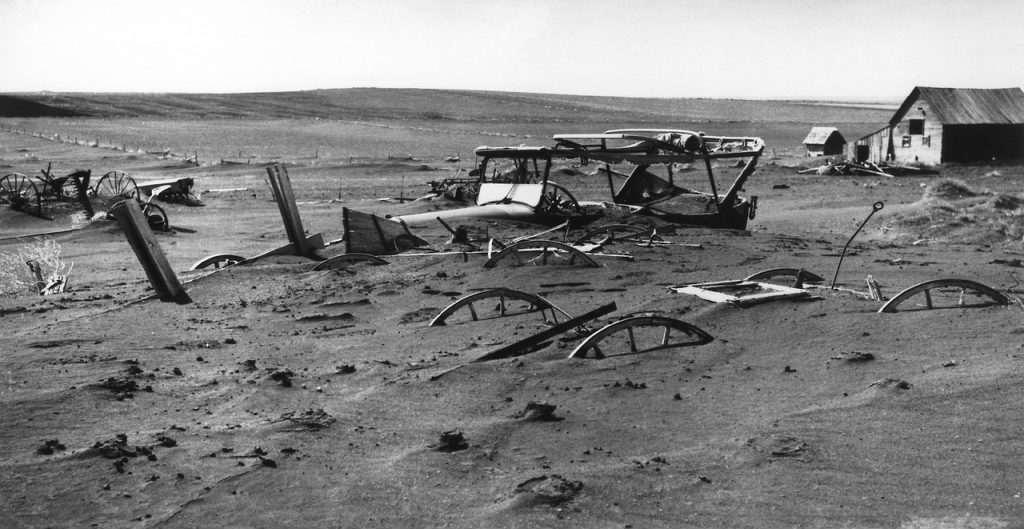My parents grew up in Northwest Kansas during the Dust Bowl of the 1930’s. Hearing their stories and listening to the hardships of that era have always kept my interest in that part of our history high. I recently came across a 4 hour video on the history of the Dust Bowl and have been watching it. I felt that I knew a fair amount about it, but was surprised at some of the things the video presented.
The Dust Bowl was a huge environmental and economic catastrophe brought on by man’s greed and belief that things would be different this time. From the Texas panhandle north to North Dakota the ecological balance of the land was torn up as more and more of the native buffalo grass, which was able to hold and live off little moisture as many regions in this area were subject to droughts, was plowed under and turned into wheat fields. Wheat prices were good, so more and more people turned to wheat farming as a way to gain financial security. As with most supply and demand crops, when supply exceeds demand, prices drop. This was the case in the mid-1930’s. As prices dropped, farmers decided that the best way to keep their income up was to produce more wheat. If wheat is selling for 50% less than it was a year ago, then I need to produce twice as much as last year to keep my income the same. Moisture was good, so the larger crops produced more wheat, creating more supply and dropping prices further. The farmers were being told that somehow the production of wheat also caused the weather to change and drought in the region was no longer a problem. Then the drought hit and the land dried up. Winds came along and picked up the topsoil where buffalo grass once grew and blew it hundreds of miles away. People had mortgaged themselves to the max to buy more land to grow wheat on and as they watched the wind blow away their good soil, they also watched the foreclosure signs go up on their property. They couldn’t pay their bills, which also meant that the hardware store owner that the farmer owed money to couldn’t pay his. So he went out of business. And on and on it went.
I turned off the video and sat there wondering, “what were they thinking?” Did they really believe that producing twice as much wheat at half the sell price was a good idea? Did they really believe that the farming of the land had eliminated drought from the region? Did they really believe that borrowing more and more money to buy and farm more and more land was a good idea? The answer to these questions is probably “yes,” but that answer was fueled by one thing. Greed.
Then it occurred to me that excluding the environmental disaster of the Dust Bowl, this economic crisis was the same as the one’s I have experienced. The crash in oil prices that occurred a few years ago was caused by people getting greedy, expanding exploration, borrowing money to produce more at a time when supply was high, and believing that prices of oil would not ever come down. Borrowing money to increase production at a time when supply was high? Believing that this time was different and oil prices would never come down? What were they thinking?
Same with the housing bubble of 2008. As mortgage lenders got greedy, they made questionable loans to questionable borrowers under the guise that “home ownership was good for everyone.” They made “no look” loans where they didn’t verify employment or income. Down payments weren’t required or were so low that they were insignificant. The homeowner had no skin in the game. The lenders had no risk because they generally sold the loans to investors as “safe” investments (much like being sold the story that growing wheat changed the climate). The “safe” investments turned out to be not so safe as borrowers (who shouldn’t have been lent to at all) began to default on their loans. Foreclosures skyrocketed and housing prices plummeted. What were they thinking?
These are the opinions of Mike Berry and not necessarily those of Cambridge, are for informational purposes only, and should not be construed or acted upon as individualized investment advice.
Mike Berry is a Registered Representative offering securities through Cambridge Investment Research, Inc., a Broker/Dealer, Member FINRA/SIPC. Investment Advisor Representative, Cambridge Investment Research Advisors, Inc., a Registered Investment Advisor. Legacy Wealth Management, LLC and Cambridge are not affiliated. Cambridge does not offer tax advice.
Copyright ©2018 Mike Berry. All Rights reserved. Commercial copying, duplication or reproduction is prohibited.

